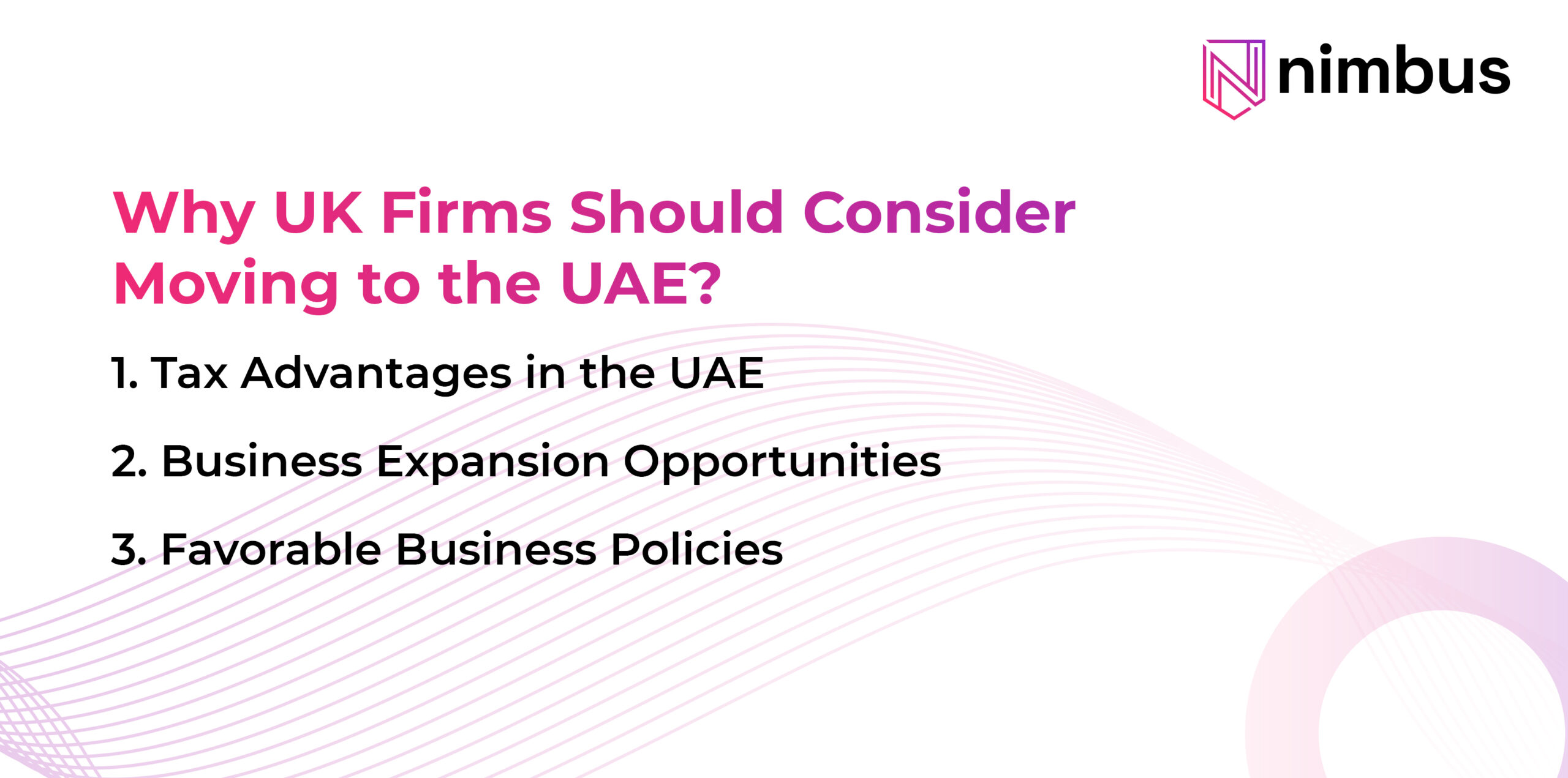The United Arab Emirates (UAE) is becoming a prime investment destination for UK businesses and individuals seeking tax efficiency, business-friendly regulations, and access to global markets.
With no personal income tax, a low corporate tax rate, and a host of economic incentives, the UAE presents a compelling alternative to the UK’s relatively higher tax regime.
For UK firms looking to expand internationally, the UAE serves as a strategic business hub connecting Europe, the Middle East, Africa, and Asia. Its advanced infrastructure, competitive tax policies, and ease of doing business make it an ideal location for companies aiming to scale globally.
Similarly, individuals benefit from tax-free earnings, no inheritance tax, and a high standard of living. This post explores the key tax advantages and business incentives that make the UAE an appealing destination for UK businesses and professionals.
Why UK Firms Should Consider Moving to the UAE?

1.Tax Advantages in the UAE
One of the primary reasons UK businesses and individuals relocate to the UAE is its favorable tax regime. While the UK imposes corporate taxes, capital gains tax, and inheritance tax, the UAE has significantly lower tax burdens.
- Corporate Tax: As of June 2023, the UAE levies a 9% corporate tax on profits exceeding AED 375,000, while profits below this threshold are exempt. In contrast, the UK applies a corporate tax rate of 25% for businesses earning over £250,000, with a reduced 19% rate for those earning below £50,000.
- No Capital Gains Tax: The UAE does not impose capital gains tax on assets such as shares, real estate, or other investments, allowing investors to maximize returns. In the UK, capital gains tax ranges from 10% to 28% depending on asset type and the individual’s income level.
- No Inheritance Tax: The UK enforces a 40% inheritance tax on estates valued over £325,000, whereas the UAE does not impose any inheritance or estate taxes. This makes wealth preservation easier for expatriates and business owners in the UAE.
- No Personal Income Tax:The UAE does not charge personal income tax, meaning employees and business owners can retain their full earnings. In the UK, personal income tax is progressive, starting at 20% and going up to 45% for incomes over £150,000.
2. Business Expansion Opportunities
Beyond tax benefits, the UAE’s geographical location and world-class infrastructure offer UK businesses a gateway to high-growth markets.
- Access to Emerging Markets: Situated at the crossroads of Europe, the Middle East, Africa, and South Asia, the UAE provides businesses with a strategic base to tap into these expanding economies.
- Advanced Infrastructure: The country boasts modern transportation systems, well-connected ports, and cutting-edge digital infrastructure, making it an attractive choice for logistics, finance, and technology-based businesses.
3. Favorable Business Policies
The UAE government has established policies to facilitate business growth, minimize bureaucracy, and encourage foreign investment.
- Ease of Doing Business: The UAE ranks highly in global ease-of-doing-business indices due to its streamlined company registration processes and investor-friendly regulations.
- Free Zones and Tax Exemptions: Companies operating in UAE Free Zones enjoy benefits such as 100% foreign ownership, corporate tax exemptions, and full repatriation of profits.
Tax Comparison Between the UK and UAE
To better understand the UAE’s advantages, it is helpful to compare the tax structures of both countries.
1. Corporate Tax Comparison
- United Kingdom: 25% corporate tax for profits exceeding £250,000; 19% for profits below £50,000.
- United Arab Emirates: 9% corporate tax on profits above AED 375,000, while profits below this remain tax-free.
2. VAT Comparison
- United Kingdom: 20% VAT applies to most goods and services.
- United Arab Emirates: 5% VAT, significantly lower than in the UK.
3. Dividends Tax Comparison
- United Kingdom: Dividend tax rates range from 7.5% to 38.1% based on the taxpayer’s income.
- United Arab Emirates: No withholding tax on dividends, allowing foreign investors to repatriate profits tax-free.
4. Capital Gains Tax Comparison
- United Kingdom: Capital gains tax ranges from 10% to 28%, depending on asset type and taxpayer’s income.
- United Arab Emirates: No capital gains tax on asset sales, including shares and real estate.
5. Personal Income Tax Comparison
- United Kingdom:
- 0% for income up to £12,570
- 20% for income between £12,571 and £50,270
- 40% for income between £50,271 and £150,000
- 45% for income above £150,000
- United Arab Emirates: No personal income tax, allowing individuals to retain 100% of their earnings.
6. Inheritance Tax Comparison
- United Kingdom: 40% inheritance tax on estates above £325,000.
- United Arab Emirates: No inheritance tax, providing better wealth protection for future generations.
Popular Free Zones for UK Firms
Some of the most sought-after Free Zones for UK businesses include:
- Dubai Multi Commodities Centre (DMCC): Ideal for trade, logistics, and commodities businesses.
- Jebel Ali Free Zone (JAFZA): Best suited for manufacturing, shipping, and warehousing companies.
- Abu Dhabi Global Market (ADGM): A top choice for financial services and fintech startups.
- Dubai Internet City (DIC): Designed for IT, digital media, and technology firms.
Why UK Businesses should Choose the UAE?

The UAE’s tax advantages, strategic location, and business-friendly policies make it a highly attractive destination for UK firms and individuals. With no personal income tax, a low corporate tax rate, and Free Zone incentives, businesses can maximize profitability while enjoying world-class infrastructure and global connectivity.
For UK businesses considering expansion, professional tax consultancy services can help navigate UAE regulations and ensure compliance. By leveraging the UAE’s favorable tax environment, UK entrepreneurs and professionals can achieve significant financial and business growth.


